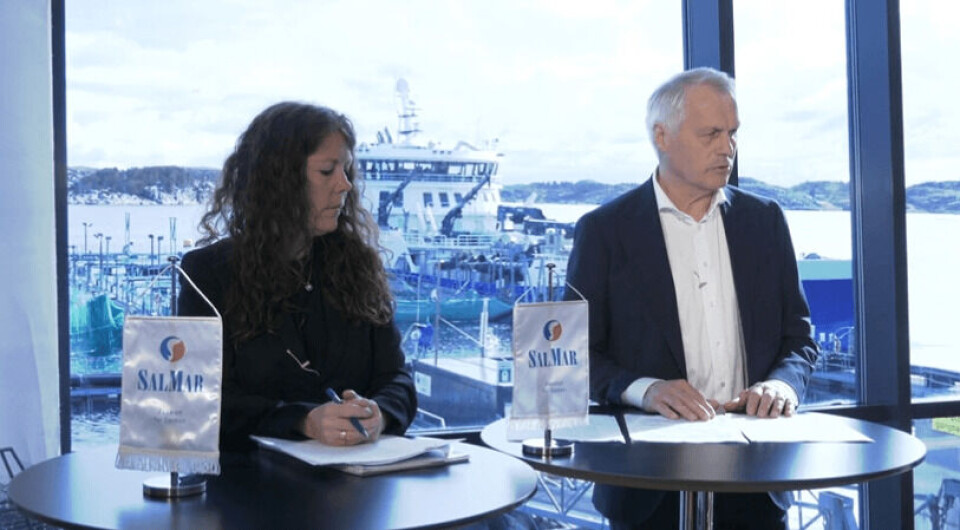
A record result for Scottish Sea Farms co-owner SalMar
Scottish Sea Farms co-owner SalMar delivered a record high operating profit (EBIT) of NOK 1,065 million in the first quarter of 2020, up from NOK 806m for the same period in 2019.
“The first quarter was very good. We posted the highest ever operational EBIT in the company’s history, achieved through strong underlying operations, high volumes and good prices. Central Norway in particular distinguished itself through solid performance in the quarter,” said chief executive Gustav Witzøe.
- Total operating revenues amounted to just over NOK 3.6 billion in the quarter, an increase of 22% from the first quarter of 2019.
- SalMar harvested 40,000 tonnes in the quarter, up from 35,500 tonnes in Q1 2019.
- The operational EBIT per kilo was NOK 26.61 per kilo, up from NOK 22.71 per kilo in the first quarter last year.
The increase is explained by higher prices and harvest volumes.
Good in central Norway
“Central Norway posted good results for the period on the back of sound operations,” SalMar said in a market announcement.
“A more even spread of the harvested volume and higher spot prices resulted in considerably better price achievement than for the previous quarter.
“The bulk of the fish harvested in the first quarter were from the autumn 2018 generation. In the second quarter, more fish deriving from the spring-2019 generation will be harvested. These have demonstrated good biological performance. SalMar therefore expects the segment to report lower costs and a slightly higher harvested volume in the second quarter of 2020 than in the first.
In the second quarter, more of our 2019 generation will be slaughtered, which has shown better biological performance than previous generations. SalMar expects lower costs and a somewhat higher harvest volume in the second quarter, compared to this quarter.”
EBIT / kg in Central Norway ended at NOK 33.50 compared to NOK 25.91 in the first quarter last year.
Northern Norway was affected by ISA
Northern Norway’s results for the quarter were affected by higher harvesting costs at sites suffering from infectious salmon anaemia (ISA), said SalMar. The company harvested 13,600 tonnes in the north, compared to 15,100 tonnes in Q1 2019.
However, the segment achieved a considerably better operating margin than in previous quarters due to cost improvements and increased spot prices. The sites affected by ISA have now been emptied out, and SalMar expects the segment to report a slightly lower harvested volume and lower costs for the second quarter this year.
EBIT / kg in Northern Norway ended at NOK 28.68 compared to NOK 23.05 in Q1 2019.
Demanding for Arnarlax
The first quarter was challenging for SalMar’s Icelandic subsidiary, Arnarlax. It had a high rate of mortality as a result of winter wounds, which resulted in a large volume of fish being harvested in a period of poor weather conditions and low sea temperatures. This led to high costs.
In the second quarter, harvesting from the same generation continues and SalMar expects significantly lower volumes and weak margins.
EBIT / kg for Arnarlax ended at NOK 4.92 compared to NOK 11.77 in Q1 2019.
As reported last week, Scottish Sea Farms, which is 50% owned by SalMar and 50% by Lerøy, harvested 2,900 tonnes, against 4,800 tonnes in the first quarter last year and received EBIT / kg of NOK 14.36 (22.78).
Sales and processing
SalMar’s Sales and Processing segment achieved good capacity utilisation and effective operations which provided good margins for the company’s harvesting and secondary processing operations. The segment also secured favourable placement of volumes at spot prices in a quarter characterised by high prices.
However, the segment made a loss of NOK 17 million as a result of a negative contribution from fixed-price contracts. The contract share was 24% during the quarter.
For the second quarter and 2020 as a whole, the contract shares are at 25% and 20% respectively, with prices somewhat higher than the level in 2019.
Going forward as planned
“The corona pandemic (Covid-19) has created significant uncertainty for world trade, and changes in consumer behaviour and transport patterns are affecting several markets,” stated the company. “SalMar is closely monitoring developments in the various markets and is constantly assessing measures to adjust its production.”
SalMar said it has a solid financial balance and good flexibility in the value chain, which ensures that the company is well-equipped to handle market changes quickly.
The company announced in March that it was cancelling a dividend to shareholders because of the uncertainty caused by the pandemic, but said today that it retained great faith in further growth in the aquaculture industry.
It is therefore continuing its investment projects as planned, including construction of the InnovaNor processing plant and the smolt plant at Senja.
SalMar maintains expectations of a harvest volume of 152,000 tonnes in Norway, of which 103,000 tonnes is in the Central Norway region and 49,000 tonnes in the Northern Norway region, and 12,000 tonnes in Iceland.






















































